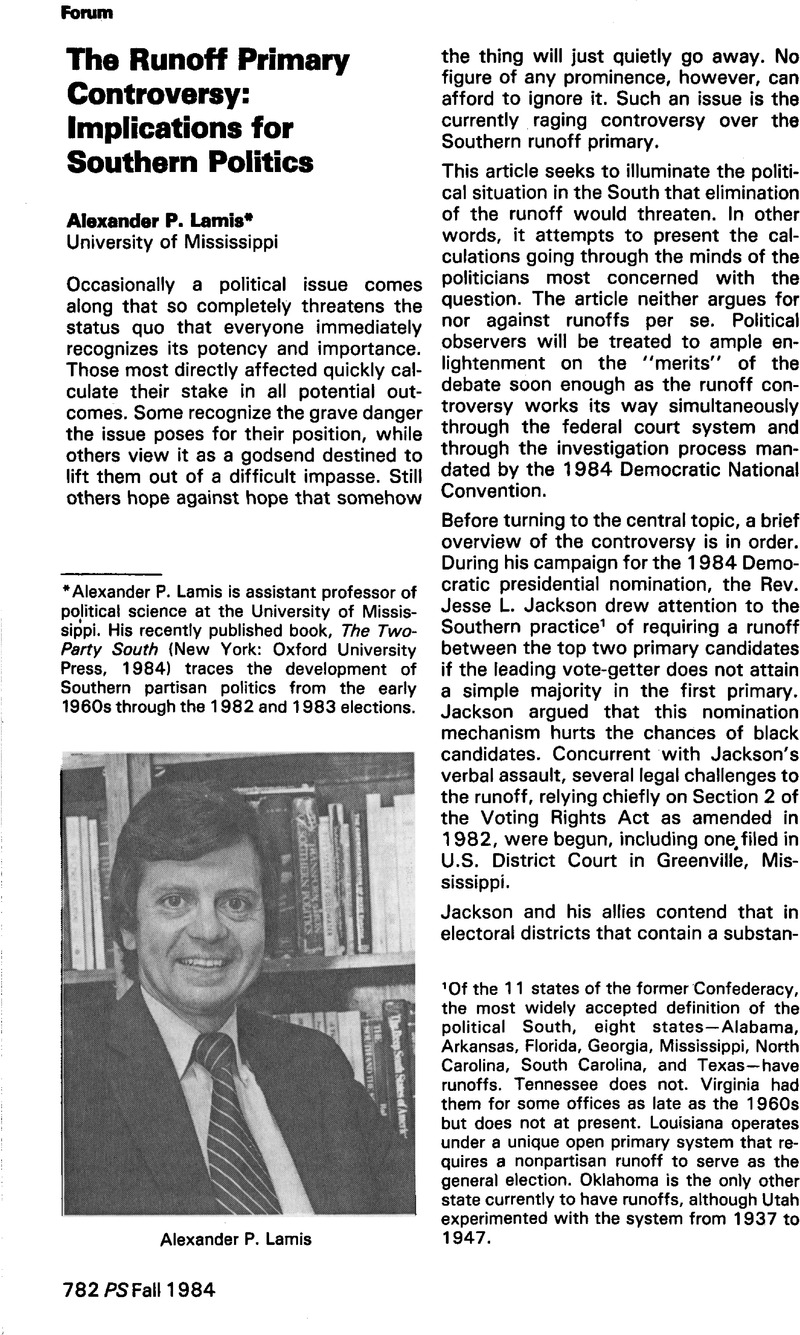Article contents
The Runoff Primary Controversy: Implications for Southern Politics
Published online by Cambridge University Press: 25 November 2022
Abstract

- Type
- Other
- Information
- Copyright
- Copyright © The American Political Science Association 1984
References
1 Of the 11 states of the former Confederacy, the most widely accepted definition of the political South, eight states—Alabama, Arkansas, Florida, Georgia, Mississippi, North Carolina, South Carolina, and Texas—have runoffs. Tennessee does not. Virginia had them for some offices as late as the 1960s but does not at present. Louisiana operates under a unique open primary system that requires a nonpartisan runoff to serve as the general election. Oklahoma is the only other state currently to have runoffs, although Utah experimented with the system from 1937 to 1947.
2 For example, in the Mississippi suit, Jackson v. Allain, one of the plaintiffs, the Rev. Henry Ward, Jr., was the only black seeking the Democratic nomination in Mississippi Legislative District 28 in 1983 against a white incumbent and several other whites. Ward led the first primary with a plurality but lost the runoff.
3 A useful discussion of the issue appeared in Focus 12,6 (June 1984), 5–9.
4 Likewise a comprehensive study of the historical origins of the runoff would be valuable, although it is doubtful that even a conclusive finding as to the intention of the drafters of the runoff statutes will affect the outcome of the current debate. J. Morgan Kousser, an historian who has written extensively on the origins of suffrage restrictions in the one-party South, gave a tentative answer in the Focus issue cited above: “But we can confidently say that direct primaries were adopted in the South at least partially to maintain white Democratic supremacy and that the run-off, adopted along with primaries themselves, functioned as a further guarantee of the partisan and racial status quo” (p. 8).
5 This discussion draws in part from my book, The Two-Party South (New York: Oxford University Press, 1984).
6 Interview with Robert Shaw, conducted by Jack Bass and Walter DeVries, April 27, 1974.
7 Interview with Lott, conducted by the author, January 23, 1979.
8 For numerous examples from various elections, see the 11 state chapters in The Two-Party South.
9 Washington Post, October 10, 1978.
10 Interview with Bowen, conducted by the author, July 28, 1982.
11 A federal court in early 1984 changed the district's lines to increase the percentage of black residents to 58 and the percentage of voting-age blacks to 53. Jackson, (Miss.) Clarion-Ledger, April 19, 1984.Google Scholar Clark, again the Democratic nominee, is seeking to unseat Congressman Franklin in this fall's election.
12 New York Times, October 14, 1982.
13 Ibid.
14 Ibid.
15 Memphis, Commercial Appeal, November 5, 1982.Google Scholar
16 The Fowler, Jenkins, , and Youngblood, quotations are from the New York Times, May 3, 1984.Google Scholar The South Carolina Democratic Convention this spring endorsed a compromise plan to reduce the threshold required to avoid a runoff from a simple majority (50 percent plus one vote) to 40 percent.
17 New York Times, May 3, 1984.
18 No doubt this realization moved Bert Lance, Georgia's Democratic party chairman, to give one of his famous one-liners when asked about the runoff controversy: “It's the wrong issue at the wrong time in the wrong place.” Memphis, Commercial Appeal, May 6, 1984.Google Scholar
- 11
- Cited by




